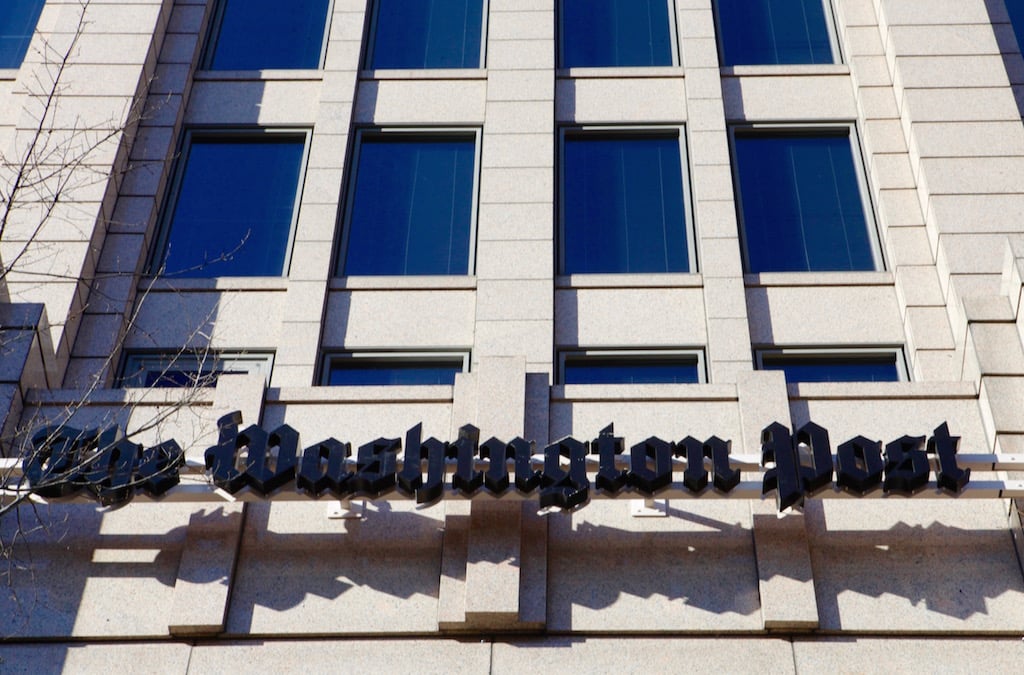The Washington Post finally has an ombudsman again, which is great news for anyone who cares about journalism. But the Post didn’t know about the hire. That’s because CJR, a publication that covers the news media, has hired someone for the position. Ana Marie Cox, the founding editor of Wonkette who has written about Washington for Time, GQ, the Guardian, and the Daily Beast, will be CJR‘s public editor for the Post. She intends to do the job from her home in Minneapolis.
So okay, the setup is a little screwy. But the Post has left media critics little choice. Its last ombudsman, Patrick Pexton, left the paper in 2013. (Washington City Paper pulled a similar stunt back then.) He was replaced by a reader representative, a position more like customer service representative than an in-house critic. That’s during a time when the stakes have arguably never been higher for independent journalism in the US and the interests of the Post‘s owner, Jeff Bezos, have ever more resonance nationally and locally.
“We’re going to enter a cycle where the media is going to be in the spotlight,” says Kyle Pope, CJR‘s editor and publisher. And in response to constant attacks from President Trump and his flunkies, Pope says he sees media types hunkering down and more likely to launch “borderline arrogant” branding campaigns rather than to reintroduce the concept of an in-house critic who can get answers outsiders can’t. “There seems to be this collective huddle,” he says, characterizing most media outlets’ reaction to criticism as “We know we’re doing God’s work.”
The new public editors—CJR has also engaged ombudspersons for CNN, MSNBC, and the New York Times—will write longer columns twice a month and shorter stories as events warrant, Pope says. Reached by phone, Cox says she doesn’t expect to track hires and promotions at Post, nor does she expect her columns to be solely about “people getting mad on the internet,” but she does hope to demystify the Post for readers.
“My experience from the blogging world was that on the left and the right there’s almost conspiratorial thinking about how mistakes happen,” Cox says. “And I guess what I think that the column will do is explain the less exciting but hopefully just as interesting ways that things appear before you.” When the Post zapped the ombudsman job, Katharine Weymouth, then the publisher, wrote that the position “was created decades ago for a different era” and that “media writers inside and outside The Post will continue to hold us accountable for what we write, as will our readers.”
That doesn’t necessarily mean the Post feels it needs to answer any of those critics. Pope says he purposely didn’t tell any of the outlets he’s hired public editors for—and yes, by the way, the positions will be paid—that he was planning to unleash an ombudsing army upon them, because “this is a CJR project, and we’re going to be in charge of the editorial.” He says he hopes the media organizations will engage with their unasked-for watchdogs, and that “I have a strong feeling that the staffs will engage”—he says he’s already received a few emails with suggestions from people who work at the outlets. This project isn’t that far off CJR‘s usual editorial ambit, he says, but it offers “a more intense focus.”
Washingtonian, on the other hand, covers the Washington Post whenever time allows. We asked the Post what it thought of CJR’s plan, and via spokesperson Shani George, it declined to comment.
Cox doesn’t seem too concerned about doing the job from Minnesota, though she allows that she’s still working out how to see the daily print edition. “I guess I will be missing whatever kind of gossip gets exchanged in person at book parties,” she says, “but I’ve never thought that was a job requirement since I got sober.”
I asked her for general impressions about how the Post is doing. “I think they’re doing a great job,” she says. “I don’t have a screaming siren in my head that they must be corrected on X, Y, or Z.” She praised its coverage of white supremacy, particularly what she sees as its “intention to cover the survivors of white supremacy and not just the people who do white supremacy.” Obviously she’ll be looking at the Post‘s Amazon coverage and its relationship to Bezos, and with regard to the 2020 presidential race, says she doesn’t “see how it can’t be a part of the job to figure out how much horse-race coverage” is appropriate for readers.
Her role models are Margaret Sullivan, the former Times public editor who now covers the news media at the Washington Post, and NYU professor Jay Rosen. She’s working out a good way for Post employees to get in touch, whether to leak, vent, or complain. “I don’t see this as an emergency intervention,” she says.
Pope says he’ll be on the lookout for signs that the properties that CJR‘s public editors police have learned lessons from the 2016 election: so far, he says, he hasn’t seen “a lot of introspection.” I asked how he could judge that from the outside of these institutions, and he allowed that in any newsroom, things can happen for “politically fraught” internal reasons. “But in a way that has nothing to do with us,” he says. “All we know is what they produce.”



















